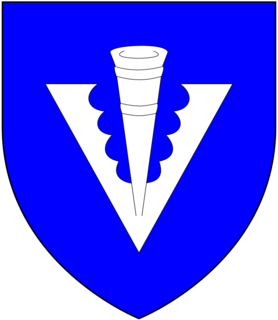John Becon | |
|---|---|
 Portrait of John Becon. | |
| Died | 1587 |
| Nationality | British |
John Becon LL.D., (died 1587), was an English divine.
John Becon | |
|---|---|
 Portrait of John Becon. | |
| Died | 1587 |
| Nationality | British |
John Becon LL.D., (died 1587), was an English divine.
Becon, a native of Suffolk, received his education at St. John's College, Cambridge. He was admitted a scholar of that society on the Lady Margaret's foundation in 1559, proceeded B.A. in 1560-1, was admitted a fellow 21 March 1561-2, and commenced M.A. 1564. Subsequently he became principal lecturer of the college. In July 1571 he was elected Public Orator of the university, and he served the office of proctor for the year 1571-2. While proctor he headed the opposition of the senate to the code of university statutes which had passed the great seal in 1570. Much disorder was the result, and the heads of colleges exhibited articles against him and his adherents. Ultimately the two archbishops and the bishops of London and Ely decided that the new statutes should stand, and censured the opponents for going from college to college to solicit subscriptions against the same. Becon resigned the oratorship in 1573. The following year he was installed a canon of Norwich, and in 1575 he became chancellor of that diocese. He took the degree of LL.D. in 1576.
On 16 February 1579-80 Becon was collated to the precentorship of the church of Chichester, and in 1581 was admitted to a prebend in the church of Lichfield. In 1582 a great contest took place between him and William Overton, bishop of Lichfield and Coventry, about the chancellorship of that diocese. The bishop, who had in the first instance granted it to Becon only, subsequently granted the office to him and one Babington, and to the longer liver of them. This occasioned a great disturbance and riot in the cathedral. The case came successively before the Star-chamber, the privy council, and the Archbishop of Canterbury, who remitted it to four visitors, and they finally induced the contending parties to compromise the matter. Becon was buried at St. Giles, Cripplegate, on 4 September 1587.
Various documents written by Becon in reference to the disputes in which he was engaged have been printed, and are enumerated in Cooper's "Athenæ Cantabrigienses". [DNB 1] [DNB 2] [DNB 3] [DNB 4] [DNB 5] [1]

John Whitgift was the Archbishop of Canterbury from 1583 to his death. Noted for his hospitality, he was somewhat ostentatious in his habits, sometimes visiting Canterbury and other towns attended by a retinue of 800 horses. Whitgift's theological views were often controversial.
John Bell LL. D was a Bishop of Worcester (1539–1543), who served during the reign of Henry VIII of England.
Richard Barnes was an Anglican priest who served as a bishop in the Church of England during the reign of Elizabeth I.
The Bishop of Lichfield is the ordinary of the Church of England Diocese of Lichfield in the Province of Canterbury.
Edward Aglionby was an English Member of Parliament, official, translator and poet. He was closely associated with the Dudley family.

Thomas Musgrave was Archbishop of York from 1847 to 1860.

Godfrey Goldsborough was a Church of England clergyman and bishop of Gloucester from 1598-1604. He was educated at Trinity College, Cambridge. He also served as a Prebendary of Worcester.
George Boleyn, dean of Lichfield was a colourful character at the court of his kinswoman, Elizabeth I of England.

John Lonsdale was the third Principal of King's College, London, and later served as Bishop of Lichfield.
Richard Curteys (c.1532?–1582) was an English churchman. A native of Lincolnshire, after his education at St. John's, Cambridge he was ordained and eventually became chaplain to Queen Elizabeth I. He was made dean of Chichester cathedral and then Bishop of Chichester. Curteys was reputedly a promoter of preaching and the clerical improvement of Anglicanism. In Curteys' episcopate, the cost of supporting many residentiaries and providing hospitality, could not be funded by the relatively small income of Chichester Cathedral. Curteys remodelled the constitution to reduce costs. Despite the changes Curteys died penniless.
Walter Haddon LL.D. (1515–1572) was an English civil lawyer, much involved in church and university affairs under Edward VI, Queen Mary, and Elizabeth I. He was a Cambridge humanist and reformer, and was highly reputed in his time as a Latinist: his controversial exchange with the Portuguese historian Jerónimo Osório attracted international attention based largely on the scholarly reputations of the protagonists.
Geoffrey Blythe was the Bishop of Coventry and Lichfield.
Richard Howland (1540–1600) was an English churchman and academic, Master of Magdalene College, Cambridge, and of St John's College, Cambridge, and bishop of Peterborough.
Bartholomew Clerke (1537?–1590) was an English jurist, politician and diplomat.

William Bradbridge (1501–1578) was an English bishop of Exeter.
Abraham Hartwell, the younger (1553/4–1606), was an English translator and antiquary, and Member of Parliament. Another Abraham Hartwell of the period was also an author, publishing Regina Literata in 1564, and the two have in the past been confused.
Geoffrey Blythe, LL.D., was an English divine.
Thomas Yale (1525/6–1577) was an English civil lawyer.
William Drury, civilian, third son of John Drury of Rougham, Suffolk, by Elizabeth, daughter of John Goldingham of Belstead, Suffolk.
Richard Becon or Beacon, was an English administrator in Ireland and author.
These references are found in the DNB article referred to above.
| Academic offices | ||
|---|---|---|
| Preceded by William Lewin | Public Orator of the University of Cambridge 1571–1573 | Succeeded by Richard Bridgewater |